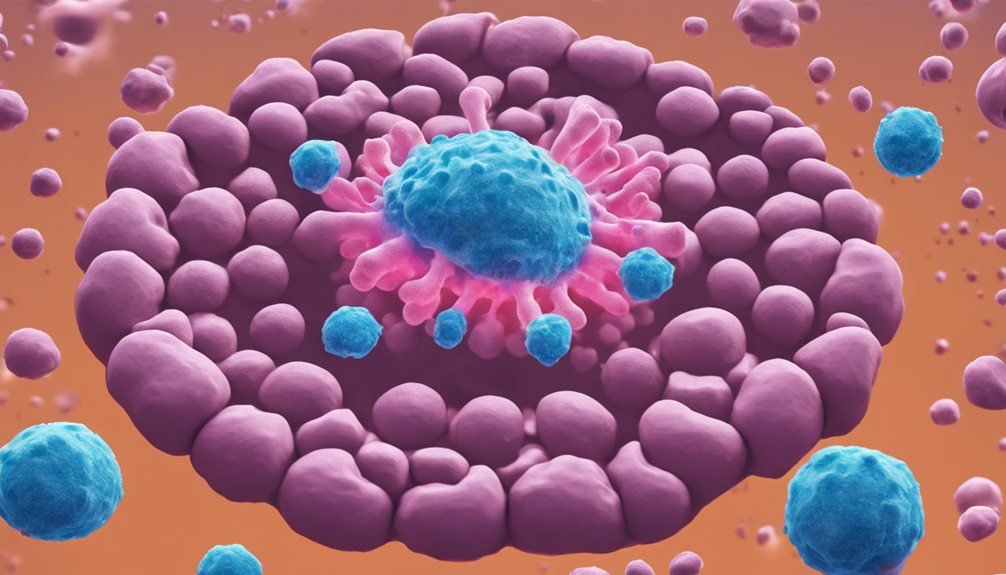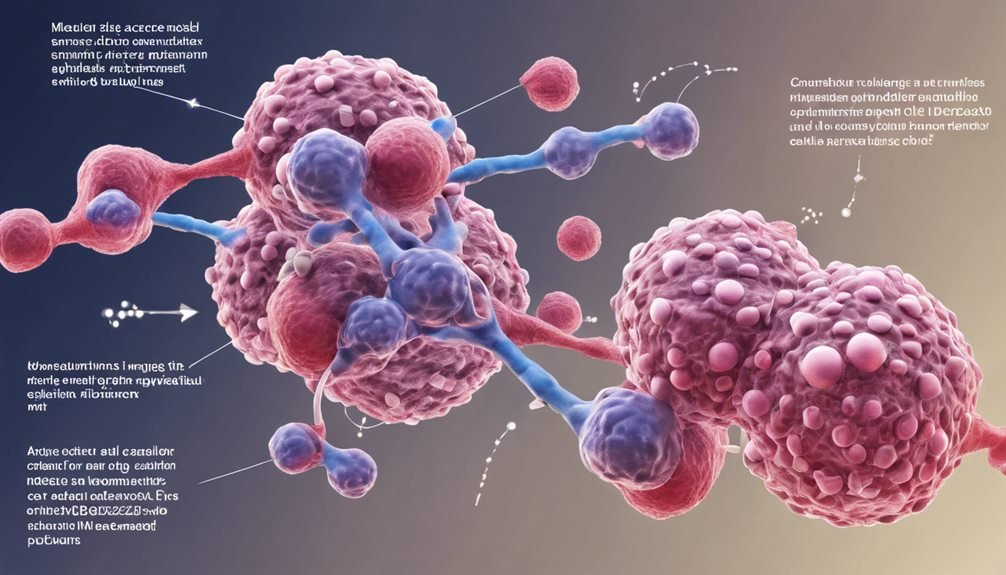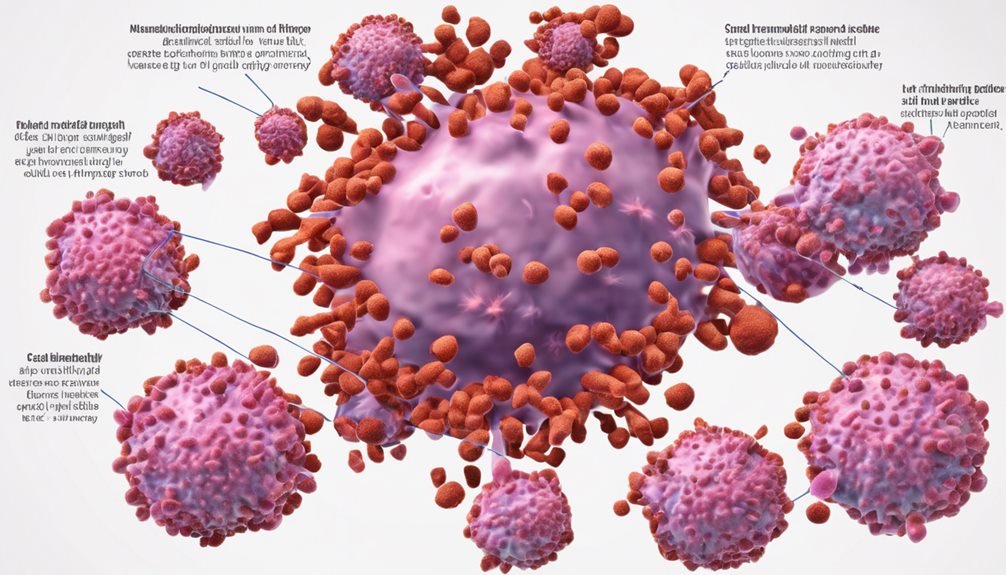Imagine a puzzle where each piece represents a different aspect of cancer treatment – now picture Mebendazole as the missing piece that could transform the entire landscape. With its unique ability to disrupt cancer cells on multiple fronts, this common antiparasitic drug holds intriguing potential in revolutionizing therapy outcomes. As you explore the intricate ways Mebendazole interacts with cancer biology, you will uncover a compelling narrative of hope and progress in the fight against this complex disease.
Key Takeaways
- Inhibits tumor growth and metastasis by disrupting microtubule function.
- Enhances traditional therapies by targeting resistant cancer cells.
- Modulates the immune response against cancer cells.
- Targets cancer stem cells, overcoming treatment resistance.
- Offers a safe profile with mild, transient side effects.
Mebendazole's Anticancer Properties
Mebendazole has garnered increasing attention for its potential as an anticancer agent. When used in combination therapy with traditional chemotherapy drugs, it has shown promising results in enhancing treatment outcomes.
The mechanism of action of mebendazole in cancer treatment involves its ability to disrupt microtubule function, leading to cell cycle arrest and ultimately cell death in cancer cells. By specifically targeting tubulin polymerization, mebendazole inhibits the growth and division of cancer cells, making it a potential candidate for combating various types of cancer.
Studies have demonstrated that mebendazole's anticancer properties extend beyond its traditional use as an anthelmintic agent. Its ability to inhibit tumor growth and metastasis has sparked interest in its potential application as an adjunct therapy in cancer treatment regimens.
The synergistic effects observed when mebendazole is combined with standard chemotherapy drugs highlight its role in enhancing the efficacy of existing treatment protocols. This novel approach to cancer therapy underscores the importance of exploring mebendazole's full potential in the fight against cancer.
Inhibition of Tumor Growth
With the increasing recognition of mebendazole's potential as an anticancer agent, its role in inhibiting tumor growth has become a focal point of research in cancer treatment. Mebendazole has shown promising results in inducing tumor regression by targeting cellular proliferation, a key process in the development and progression of cancer.
Studies have indicated that mebendazole interferes with microtubule function in cancer cells, leading to cell cycle arrest and ultimately, a reduction in tumor size. By disrupting microtubule dynamics, mebendazole inhibits the ability of cancer cells to divide and multiply, thereby impeding tumor growth.
This mechanism of action highlights mebendazole's potential as a novel therapeutic approach in combating various types of cancers. The ability of mebendazole to halt cellular proliferation and induce tumor regression underscores its significance in cancer treatment and emphasizes the need for further investigation into its efficacy as an anticancer agent.
Prevention of Metastasis

In the realm of cancer research, the focus now shifts towards understanding the potential of mebendazole in preventing metastasis, a critical aspect of cancer progression. Metastasis prevention is crucial as it involves the spread of cancer cells from the primary tumor to other parts of the body, leading to more severe stages of the disease. Mebendazole shows promise in inhibiting this process through various cellular mechanisms.
Studies suggest that mebendazole can interfere with microtubule function, affecting cell division and migration, which are essential for metastasis. Additionally, mebendazole has been found to inhibit angiogenesis, the formation of new blood vessels that tumors need for growth and spread.
Enhanced Cancer Therapy Efficacy
Enhancing the efficacy of cancer therapy involves a multidimensional approach that aims to maximize treatment outcomes and minimize adverse effects. One key strategy in achieving this goal is through the utilization of combination therapies. By combining different treatment modalities such as chemotherapy, radiation, immunotherapy, and targeted therapy, healthcare providers can target cancer cells through multiple pathways, increasing the likelihood of treatment success.
However, a significant challenge in cancer treatment is the development of resistance mechanisms. Cancer cells can adapt and become resistant to the effects of certain therapies, leading to treatment failure.
Mebendazole, with its potential to inhibit pathways involved in resistance mechanisms, offers a promising solution. Studies have shown that mebendazole can enhance the effectiveness of traditional cancer treatments by reversing resistance mechanisms, thereby improving treatment outcomes.
Synergistic Effects With Traditional Treatments

Considering the potential of mebendazole to enhance the efficacy of traditional cancer treatments by targeting resistance mechanisms, it's crucial to explore the synergistic effects that can be achieved when combining mebendazole with standard therapies. When used in combination with traditional treatments, mebendazole has shown promising results in overcoming treatment resistance mechanisms, ultimately leading to improved outcomes for cancer patients. Here are some key points to highlight:
- Combination therapy effectiveness: Mebendazole has been found to enhance the effectiveness of chemotherapy and radiation therapy when used together.
- Targeting resistant cancer cells: By targeting resistance mechanisms in cancer cells, mebendazole can help overcome treatment resistance and improve response rates.
- Enhanced tumor regression: Studies have demonstrated that combining mebendazole with traditional treatments leads to enhanced tumor regression and improved survival rates.
- Reduced side effects: The use of mebendazole in combination therapy has shown potential in reducing the side effects commonly associated with traditional cancer treatments.
- Increased treatment sensitivity: Mebendazole has the ability to increase the sensitivity of cancer cells to traditional therapies, making them more effective in eradicating tumors.
Impact on Angiogenesis
With regards to the impact of mebendazole on angiogenesis, its potential to disrupt the process of new blood vessel formation within tumors is a subject of significant interest in cancer research. Mebendazole has shown promise in inhibiting angiogenesis, a crucial mechanism for tumor progression. By interfering with vascularization pathways essential for tumor growth, mebendazole may impede the formation of new blood vessels that supply nutrients and oxygen to cancer cells. This inhibition of angiogenesis could potentially restrict tumor growth and metastasis, contributing to improved treatment outcomes in cancer patients.
Studies have suggested that mebendazole's anti-angiogenic properties may help in slowing down or even halting the progression of certain types of cancers. By targeting the intricate network of signaling pathways involved in angiogenesis, mebendazole offers a potential strategy to combat the growth and spread of tumors. Understanding the mechanisms by which mebendazole influences angiogenesis is essential for harnessing its full potential in enhancing cancer treatment regimens.
Induction of Apoptosis in Cancer Cells

In the realm of cancer treatment, the induction of apoptosis in cancer cells stands as a pivotal mechanism that influences the effectiveness of therapeutic interventions. Understanding the intricate mechanisms through which apoptosis is triggered can shed light on how Mebendazole might enhance cancer treatment outcomes. Here are some key points to consider:
- Apoptosis Mechanisms:
- Mebendazole has been shown to induce apoptosis in cancer cells by affecting microtubule function, leading to cell death.
- Studies suggest that Mebendazole can activate pro-apoptotic proteins and inhibit anti-apoptotic factors within cancer cells.
- Therapeutic Implications:
- The ability of Mebendazole to promote apoptosis in cancer cells has significant therapeutic implications, potentially enhancing the efficacy of traditional cancer treatments.
- By targeting apoptosis pathways, Mebendazole may help overcome resistance mechanisms that cancer cells develop against chemotherapy and other treatments.
Understanding how Mebendazole influences apoptosis in cancer cells opens up possibilities for novel therapeutic strategies and improved outcomes in cancer treatment.
Immune Modulation by Mebendazole
Studying the immune modulation effects of Mebendazole unveils a promising avenue in cancer treatment research. Mebendazole has shown the potential to enhance the immune response against cancer cells by affecting various immune cells and inflammatory markers. Research indicates that Mebendazole can stimulate immune cells like macrophages and lymphocytes, which play crucial roles in combating cancer. These immune cells are essential for recognizing and destroying cancerous cells effectively.
Additionally, Mebendazole has been found to reduce the levels of inflammatory markers, such as cytokines, which are often associated with tumor growth and progression.
Targeting Cancer Stem Cells

Research on Mebendazole's potential in cancer treatment has led to a compelling focus on targeting cancer stem cells. By honing in on these crucial cells, there's a promising avenue for enhancing cancer treatment outcomes. Here's a closer look at the therapeutic potential of targeting cancer stem cells with Mebendazole:
- Stem Cell Dynamics: Mebendazole has shown the ability to disrupt the self-renewal process of cancer stem cells, potentially hindering tumor growth.
- Differentiation Induction: Mebendazole may promote the differentiation of cancer stem cells into less aggressive cell types, reducing their tumorigenic potential.
- Tumor Heterogeneity: Targeting cancer stem cells with Mebendazole can address the heterogeneous nature of tumors by tackling the root of tumor regrowth.
- Resistance Reversal: Mebendazole could help overcome treatment resistance by specifically targeting the subset of cancer cells responsible for treatment failure.
- Combination Therapy: Utilizing Mebendazole alongside traditional cancer treatments may lead to synergistic effects, maximizing therapeutic outcomes.
Safety and Tolerability Profile
Exploring the safety and tolerability profile of Mebendazole in the context of cancer treatment reveals critical insights into its potential clinical utility. Patient compliance is crucial for successful treatment outcomes. Mebendazole is generally well-tolerated, with most adverse reactions being mild and transient. Common side effects include gastrointestinal symptoms such as nausea, vomiting, and diarrhea. Serious adverse reactions are rare but can include liver dysfunction and allergic reactions. It is important for healthcare providers to monitor patients for any signs of adverse reactions and adjust treatment accordingly.
| Aspect | Details | Importance |
|---|---|---|
| Patient Compliance | Crucial for treatment success | High |
| Adverse Reactions | Mostly mild and transient | Moderate |
| Monitoring | Essential for detecting serious reactions | High |
Incorporating Mebendazole into cancer treatment regimens requires vigilant monitoring of patients to ensure safety and efficacy. By addressing adverse reactions promptly and promoting patient compliance, healthcare providers can optimize the benefits of Mebendazole in cancer therapy.
Clinical Trials and Research Findings

Delving into clinical trials and research findings sheds light on the efficacy and potential applications of Mebendazole in cancer treatment.
- Clinical trial outcomes: Several clinical trials have shown promising results regarding Mebendazole's ability to inhibit cancer cell growth and induce cell death in various types of cancer.
- Research implications: Studies suggest that Mebendazole may enhance the effectiveness of traditional cancer therapies like chemotherapy and radiation, potentially leading to improved treatment outcomes.
- Clinical evidence: Research has demonstrated Mebendazole's ability to disrupt microtubule function in cancer cells, making it a promising candidate for combination therapies.
- Patient responses: Some clinical trials have reported positive responses in patients with advanced or refractory cancers, indicating Mebendazole's potential as a treatment option in challenging cases.
- Future investigations: Ongoing research aims to further elucidate the mechanisms of Mebendazole's anti-cancer effects and explore its potential in combination with emerging immunotherapies.
Future Directions and Implications
What potential avenues exist for further harnessing Mebendazole's anti-cancer properties in clinical settings? One promising direction is exploring combination therapies where Mebendazole is used alongside traditional chemotherapeutic agents to enhance treatment outcomes. This approach can potentially lead to synergistic effects, higher efficacy, and reduced drug resistance. Additionally, identifying biomarkers that can predict patient response to Mebendazole treatment is crucial for personalized medicine in oncology. By understanding which patients are most likely to benefit from Mebendazole, healthcare providers can tailor treatment strategies, improving overall outcomes.
| Potential Avenues for Mebendazole in Cancer Treatment | |
|---|---|
| 1. Combination Therapies | 2. Biomarker Identification |
| – Explore synergistic effects with traditional chemotherapeutic agents | – Identify biomarkers predictive of patient response to Mebendazole |
| – Assess efficacy and potential reduction in drug resistance | – Personalize treatment strategies based on biomarker profiles |
| – Enhance overall treatment outcomes through combined therapies | – Improve precision medicine in oncology with biomarker-guided approaches |
Frequently Asked Questions
What Are the Potential Side Effects of Combining Mebendazole With Cancer Treatments?
When combining mebendazole with cancer treatments, potential interactions may lead to adverse effects. Long-term effects of this combination are still being studied, but some common side effects include gastrointestinal issues, liver toxicity, and potential drug interactions with chemotherapy agents.
It's crucial to monitor patients closely for any signs of toxicity or unexpected reactions when using mebendazole alongside traditional cancer treatments.
Can Mebendazole Be Used in Combination With All Types of Cancer Therapies?
In the realm of drug interactions, it's crucial to consider how mebendazole aligns with various cancer therapies. The efficacy comparison across different treatments can vary, so it's essential to consult with healthcare providers to ensure compatibility.
Not all cancer therapies may work harmoniously with mebendazole, potentially impacting treatment outcomes. Seek guidance from medical professionals to navigate the complexities of combining mebendazole with different types of cancer treatments for optimal results.
How Does Mebendazole Affect Healthy Cells in the Body During Cancer Treatment?
During cancer treatment, mebendazole may cause cellular toxicity in healthy tissue. This can potentially impact normal cell functioning and interfere with the body's regular processes. It's crucial to monitor these effects closely to ensure that the treatment doesn't harm healthy cells.
Understanding how mebendazole affects healthy tissues is essential for developing strategies to minimize any potential negative impacts on the body while targeting cancer cells effectively.
Is Mebendazole Equally Effective in Treating Different Types and Stages of Cancer?
Mebendazole effectiveness varies across cancer types and stages. While research shows promise in certain cancers, like glioblastoma and breast cancer, it may have limited impact on others. Understanding the specific mechanisms of action is crucial to determine its efficacy. Clinical trials are ongoing to explore its potential benefits across a broader spectrum of cancer types, aiming to provide more tailored treatment options based on individual cancer characteristics.
Are There Any Dietary Restrictions or Considerations When Taking Mebendazole for Cancer Treatment?
When considering dietary considerations while taking mebendazole for cancer treatment, it's essential to be cautious of potential interactions. Certain foods can impact the absorption and effectiveness of mebendazole.
It's advisable to avoid grapefruit and grapefruit juice, as they can interfere with the medication. Additionally, high-fat meals may also affect how your body processes mebendazole.
Always consult with your healthcare provider for personalized guidance on managing dietary restrictions while on this treatment.
Conclusion
In conclusion, Mebendazole's intricate dance with cancer cells paints a vivid picture of hope and progress in the oncology landscape. Like a skilled artist, it delicately disrupts tumor growth, prevents metastasis, and targets cancer stem cells with precision. Its harmonious collaboration with traditional treatments creates a symphony of enhanced therapy efficacy. As we navigate the complex canvas of cancer treatment, Mebendazole shines as a beacon of promise, illuminating a path towards improved outcomes and personalized care.





